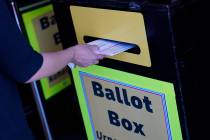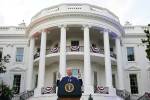The latest injustice in endoscopy center scandal
To the editor:
I read with anger that a judge has ruled a class-action lawsuit against Dr. Dipak Desai and his Endoscopy Center of Southern Nevada is not warranted (Thursday Review-Journal). If this doesn't warrant a class-action lawsuit, I don't know what does.
My husband learned that he had undergone a colonoscopy at a facility that reused syringes and put him at risk for disease.
I would like to ask District Judge Allan Earl, was he glued to the television to learn his fate? Did he have to learn from television that an instrument was placed in his body that might have had fecal matter from another person still on it? How disgusting is that?
Did he have to worry about kissing his family for fear of infecting them? Did he have to get tested to learn his fate? Did he get that dreaded letter in the mail? Did his insurance company telephone him personally to make sure he was tested?
I think not, or he would not have been so cavalier in his ruling.
In these United States, no one should ever have to worry that unsafe and unsanitary procedures are being used on them for someone else's profit. The lawsuits against Dr. Desai are not about money -- they are about ensuring that not one single person ever has to worry about this again. Dr. Desai and all the people he employed who joined him in these practices should be prosecuted, lose their medical licenses and have every single penny taken from them.
Where is the justice here? I hope that judge is removed from office. Maybe this is all political, as has previously been reported. What has happened to these United States that are supposed to govern for the people?
Nancy Malone
LAS VEGAS
A deserving loss
To the editor:
Expect Nevada Rep. Jon Porter to blame eight years of George W. Bush for his Tuesday defeat in the 3rd Congressional District.
He's wrong. Rep. Porter defeated himself by ignoring his constituents, being a do-nothing congressman and allowing his handlers to run the nastiest campaign in Nevada. His campaign ads should have focused on his congressional accomplishments, but he has none.
Rep. Porter made the wrong decision. The voters made the right decision. The congressman has only himself to blame.
Jim Frake
LAS VEGAS
Economic errors
To the editor:
Columnist Walter E. Williams set up a straw horse and skewered it in "Capitalism and the financial crisis" (Tuesday Review-Journal) when he stated: "You can decide whether we have an unregulated laissez-faire economy." He went on to prove that we have regulations.
But absolutely no one in America believes that we have an unregulated economy. What we have is an under-regulated economy, or regulations that have not been enforced under the Bush administration. Chris Cox, chairman of the Securities and Exchange Commission, now wants Congress to give him more authority over certain transactions. Former Federal Reserve Chairman Alan Greenspan admits he erred in not seeing the need for regulation of market forces he thought would be self-policing or self-correcting. Nobody regulated the "liar loans" and the ensuing mortgage fiasco that seemed to be benefiting everyone.
Mr. Williams also asserted that no lender would extend credit to deadbeats were it not for regulatory pressure, but that is not necessarily true. A lender would make such loans if he could get another sucker to buy the loans and be free of liability when the loans defaulted. And in this tiny, unregulated area of capitalism, that is exactly what happened.
America has not had totally unregulated capitalism for almost 100 years, but it was good of Mr. Williams to discover that and point it out to us.
Stuart Opotowsky
HENDERSON
Consumer culture
To the editor:
Two commercials that have been running on TV remind me of the way it was and the way it is now.
We old folks remember how we used to purchase merchandise on the "layaway plan." Like the lady in the commercial who loads up her cart with Christmas purchases, we would load up a cart and pay a little at a time for the items. The store would save our items until we made the final payment. We wouldn't think of buying on credit. If we didn't have the money, we wouldn't buy, simple as that.
Now, contrast that with the man who goes into a mega-electronics store for a new TV. He sees a whole wall with televisions on display. The accompanying song proclaims, "I want it all! I want it all! I want it all, and I want it now!" Of course, he pays with a credit card.
Isn't there a moral to this?
ESTELLE DISSELHORST
LAS VEGAS
A return to investment
To the editor:
It seems unfair that high-risk borrowers are getting kicked out of homes while high-risk lenders are getting bailed out. If we wanted to be fair and stabilize the housing market, we would convert all high-risk loans to 40- or 50-year fixed-interest loans.
If we converted high-risk loans to long-term loans, the monthly payments would be lowered, which would enable people to keep their homes.
If we moved to long-term loans, we might also find ourselves moving from wild speculation to genuine investment. Wouldn't that be nice?
EVAN BLYTHIN
BLUE DIAMOND
Liberal doublethink
To the editor:
Sorry, but in consideration of the election of an abortion supporter to the office of president of the United States, and the court-backed argument that a fetus is not a human being until surviving passage through the birth canal, which is the justification for allowing abortion, there is no reason to charge anyone with killing a "non-human" ("Death of fetus to bring charge," Thursday Review-Journal).
The "doublethink" of George Orwell's "1984" is alive and well under liberalism.
Charles J. Lingo
HENDERSON
Water shortages
To the editor:
The energy crisis will pale in comparison to this century's coming water shortage. Before the next presidential election, 36 states will have freshwater shortages that will become severe by 2025.
A United Nations report indicates water shortages affect 400 million people now and will affect 4 billion by 2050. Causes include migration and growth of population, waste, pollution (95 percent of world cities dump raw sewage) and reduced snowfall/evaporation.
There is no silver bullet. Where feasible, new governmental construction should capture rain and include solar panels. Desalination may ease demand. The United States was the world leader; now Saudi Arabia, Israel and Japan lead. Oceanfront states California, Florida and Texas used 25 percent of the country's potable water in 2000.
We need tax credits for solar energy and a capital gains tax moratorium on developers of water efficiency and renewable energy to reduce global warming. $300 billion in pipe upgrades are needed over the next 30 years. Land is needed to store water during wet seasons. Treated wastewater usable for irrigation, which accounts for 85 percent of freshwater consumption worldwide, cannot be dumped. Building codes should require low-volume toilets and systems that filter shower, bath and laundry water for toilet tank reuse. Alternative cooling of thermoelectric plants, which use exorbitant amounts of water, is needed. Water-smart landscaping and other restrictions are unavoidable.
Water costs and rights contests will grow. Colorado River water policies were established in the early 20th century, when water volume was historically high. A pipeline is proposed to bring water from Northern Nevada to Las Vegas. Nevada seeks water in aquifers from California's Death Valley and western Utah.
We need a federal Department of Water. The solutions could create enormous economic opportunities.
Eric A. Daly
LAS VEGAS























